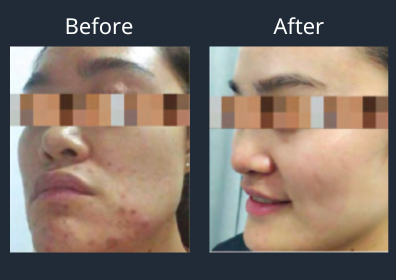Exosomes, tiny vesicles secreted by cells, have become a game-changer in skincare, offering a novel approach to skin rejuvenation and repair. These nano-sized particles serve as messengers, delivering essential proteins, lipids, and genetic material to recipient cells. The origin of exosomes—whether from plant cells, animal cells, human cells, or artificial sources—plays a significant role in their effectiveness. Let’s dive deeper into each type and see how Fiosome, a leader in human-cell-derived exosome technology, stands out in therapeutic and skincare applications.
What Exosomes Do for Your Skin
Exosomes are packed with essential signaling molecules and nutrients that newborn cells need to thrive. By repairing damaged and aging cells, exosomes restore vitality and energy, breathing new life into your skin.
Once exosomes penetrate the skin, they automatically release nutrients, continuously enhancing the cellular environment and addressing skin concerns at their root. They stimulate cell migration, proliferation, and collagen synthesis, leading to thicker, healthier skin and a strengthened skin barrier.
Exosomes are particularly effective in repairing UV-induced cellular aging and sun damage. Using methods like microneedling, hydradermabrasion, or pressure-based rollers, they penetrate deep into the dermis to promote the production of type I collagen and elastin. This results in improved skin elasticity, reduced fine lines, and a brighter, more youthful complexion.
Incorporating exosomes into skincare routines or treatments offers unparalleled benefits, making them a powerful tool in skin rejuvenation and repair.
1. Plant Cell Exosomes: Nature’s Antioxidants
Plant-derived exosomes are sourced from fruits, vegetables, and herbs like green tea and grapes. These exosomes are rich in natural antioxidants, polyphenols, and vitamins.
- Benefits:
They help combat oxidative stress, reduce inflammation, and support a healthy skin barrier. - Drawbacks:
Plant exosomes have limited compatibility with human cells, potentially reducing their effectiveness in deep skin repair.
2. Animal Cell Exosomes: High Compatibility but Ethical Concerns
Animal-derived exosomes, often obtained from bovine or porcine sources, exhibit better compatibility with human cells than plant-derived ones.
- Benefits:
They deliver growth factors and proteins that stimulate collagen production and enhance skin elasticity. - Drawbacks:
Ethical concerns, potential for allergenic reactions, and variability in quality make them less appealing for many consumers.
3. Human Cell Exosomes: The Gold Standard in Skincare
Human-derived exosomes, extracted from stem cells or immune precursor cells, are at the forefront of skincare innovation.
- Benefits:
- Superior compatibility with human skin.
- Effective in promoting cell regeneration, reducing inflammation, and stimulating collagen production.
- Address a wide range of skin concerns, including aging, pigmentation, and acne scars.
- Drawbacks:
More expensive due to the complex extraction and purification process.
4. Artificial Cell Exosomes: Emerging Potential
While artificial exosomes are still in the experimental stage, researchers are developing synthetic vesicles that mimic natural exosomes.
- Benefits:
- Customizable for specific therapeutic uses.
- Free from ethical concerns and biological variability.
- Drawbacks:
Limited availability and ongoing research mean they are not yet widely used in skincare.
Comparing Exosome Sources for Skincare
| Source | Benefits | Drawbacks |
|---|---|---|
| Plant Cells | Rich in antioxidants, natural ingredients | Limited human cell compatibility |
| Animal Cells | Effective in collagen stimulation | Ethical concerns, allergenic risks |
| Human Cells | Best compatibility, promotes deep skin repair | Higher cost |
| Artificial Cells | Customizable, no ethical issues | Still in research phase |
Fiosome: A Leader in Human-Cell-Derived Exosomes
Fiosome leverages cutting-edge human-cell exosome technology to deliver unparalleled skincare benefits. Its immune precursor cell-derived exosomes are carefully purified using advanced chromatography techniques, ensuring ultra-high concentrations and superior quality.
Benefits to Skin
- Deep Repair: Stimulates collagen production, smooths wrinkles, and reduces scars.
- Anti-Inflammatory: Calms redness and irritation, restoring a healthy glow.
- Brightening Effect: Regulates melanin production, improving skin tone and reducing pigmentation.
- Hydration Boost: Enhances skin’s moisture retention, leaving it plump and radiant.
Therapeutic Uses
Fiosome exosomes aren’t just about aesthetics—they also have therapeutic applications:
- Anti-Aging: Delays skin aging by repairing damage at the cellular level.
- Skin Disorders: Effective in treating conditions like eczema, rosacea, and acne scars.
- Post-Treatment Recovery: Accelerates healing after cosmetic procedures like microneedling and laser treatments.
Conclusion
Exosomes represent the pinnacle of innovation in skincare, with their source playing a critical role in their efficacy. While plant and animal exosomes offer unique benefits, human-cell-derived exosomes, like those in Fiosome products, provide unmatched results for skin rejuvenation and therapeutic use. As artificial exosomes continue to develop, the future of skincare looks even brighter.
Ready to experience the transformative power of Fiosome? Embrace the future of skincare today!



